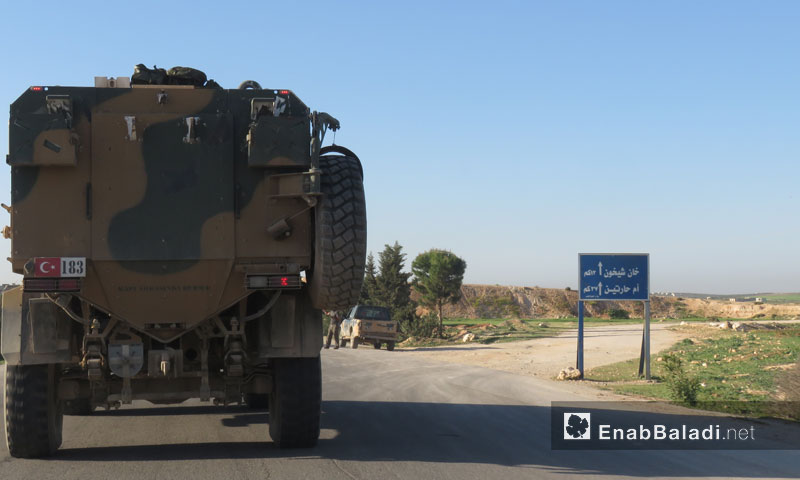



Turkey has continued the steps agreed upon by the last “Astana” Talks which provide for installing monitoring points in Idlib and rural Hama, the number of which is eight to the day, concentrated at the length of the eastern borders of the area, which can be viewed as independent in terms of military operations, leaving the western area’s fate to the upcoming agreements, the latest repercussions of which was the Ankara summit that brought together the leaders of Turkey, Russia and Iran.
Talks about Idlib’s western borders is related to information about military developments which the borders might witness in the upcoming days, which observers mostly linked to Russia and Assad’s forces while sources have attributed to the opposition factions that intend to initiate a battle in the direction of rural Lattakia.
Despite the spread of the monitoring points, the Russian aircraft continue their air raids that basically targeted southern Idlib and the western areas along the Turkish borders, which points a large question mark at the possibility of curbing Assad’s and Russia’s objectives through the agreement that include the area.
Under the latest developments witnessed by Northern Syria, Turkey have installed the eighth monitoring point in the city of Murak, in northern Hama and the areas surrounding it; this was the first time since Idlib entered the circle of the Turkish-Russian talks.
The last point was preceded by seven points in Andan in the northern countryside of Aleppo, three points in the western countryside of Aleppo, a point in Talat al-Iss in the southern part of the governorate, in addition to two points in Tell Touqan and the surrounding of Maarrat al-Nu’man to the east of Idlib.
The most important characteristic about the eight-installed point in Northern Hama is that it came two days after the meeting that joined the presidents of Turkey, Russia and Iran in Ankara, during which they discussed the developments in the Syrian file and stressed the implementation of the “Astana” talks.
At the end of last January, Ankara and Moscow agreed to accelerate the installation of the fourth monitoring point in Idlib governorate, under the “de-escalation” agreement, signed in October 2017.
With the Turkish delegations’ entry to explore the points before installing them, the towns and villages in Northern Hama have witnessed public demonstrations that asked the Turkish army to enter the area as to prevent any military operation by Assad’s forces and Russia.
The “Free” Hama Governorate Council, under the Syrian Interim Government, called on Ankara to spread monitoring points in the governorate.
The Council’s Director Nafie Barazi told Enab Baladi that the demand came as a result for the latest threats issued by Assad’s forces and Russia at the western countryside of Hama in particular and rural Hama in general.
Barazi pointed out that “advancing towards these areas threatens to displace more than 200 thousand people and inflate the crisis, especially after we received the people displaced from Ghouta,” considering that “the Turkish presence deters the progress, stabilizes the area and achieves security.”
In sync with installing the eight point, Enab Baladi managed to get information that the opposition’s military factions are preparing for a military operation against Assad’s forces and ally militias in rural Lattakia.
Identical sources on April 7 said that most of the factions, which are functioning in Idlib’s governorate are preparing to start an operation with a Turkish support to control the two mountains of al-Akrad and al-Turkmen in rural Lattakia.
The sources added that the expected attack might relate to the latest Russian-Turkish agreements, discussed in the last meeting between the Turkish president Recep Tayyip Erdoğan, the Russian Vladimir Putin and the Iranian Hassan Rouhani.
In a report published in September 2017, the Turkish Newspaper “Yeni Şafak” said that Turkey in cooperation with the factions of the “Free Army” will enter the western area of the city of Idlib, overlooking the Turkish state of Hatay, 35 kilometers deep and 130 kilometers long.
And explained that the forces will enter through Jisr al-Shughur and Darat Izza, pointing out that the space which Turkish forces and the “Free Army” will be controlling is about five thousand square kilometers.
“Yeni Şafak” pointed out that the operation aims to control two major points within the areas expanding from Afrin, reaching the Turkmen mountain in Lattakia.
The military advisor in the “Free Army” Ibrahim al-Idlbi illuminated the idea of launching an operation at the coast’s front, which the current international agreements deny.
He confirmed to Enab Baladi the rumors and talks about the battel. However, he said that “It is not possible due to the presence of Russian and Iranian forces in the costal area, in addition to Assad’s forces”.
According to al-Idlibi, Turkey has fixed its eight-monitoring point in Tal al-Sawan in Murak, northern Aleppo. The Turkish forces arrival at this point places al-Arbaeen mountain, Khan al-Subul and Saraqib within the Turkish frame.
Assad’s forces and alley militias control a large area in the northern countryside of Lattakia, and since 2016, they have progressed to the two mountains of al-Akrad and Turkmen and controlled a number of strategic towns, the most important of which are Salma, Kinsabba and Rabiaa.
if you think the article contain wrong information or you have additional details Send Correction